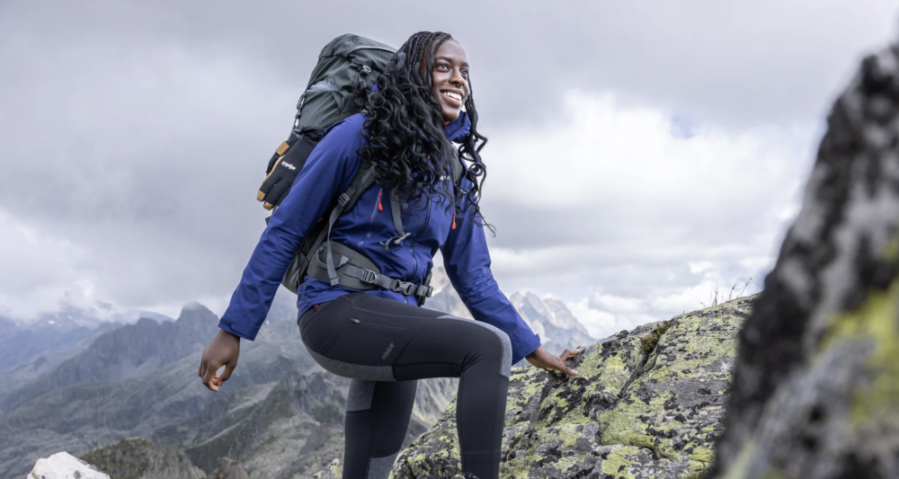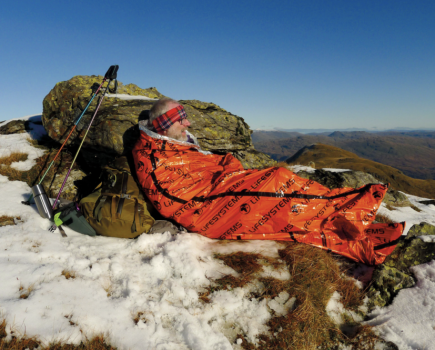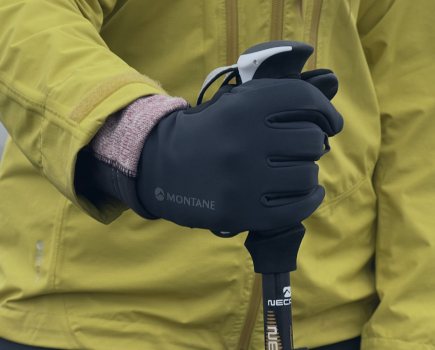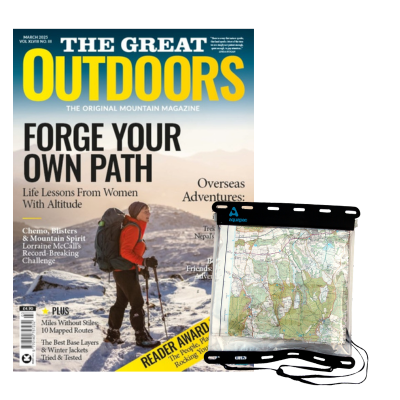In a very maritime climate, waterproof jackets are one of the most important bits of kit we carry, and making sure they’re right for us requires fit, fabric and features to work together. Obviously, their main job is to keep us dry, but that’s not just from the weather on the outside. We do need them to shed rain, snow and drizzle, and we also need them to breathe and let our sweat out so we’re not wet on the inside.
Main image: The Alpkit Balance | Credit: Alpkit
It’s a compromise, because a more breathable membrane is generally less waterproof and vice versa. And at the end of the day, the biggest flaw in jackets is all the holes for our heads and hands, so water will inevitably get in if it’s really wet!
Jackets are often designed for a specific activity and suit that well, but can still be used for others. Think about what you want to do and when, and then find one will do most, acknowledging that a winter mountaineering jacket and trail running jacket will look and behave quite differently.
A few features that are important to get right are pockets, fit, hood style, and cuffs. It’s possible to compromise in other ways, but making sure hoods and cuffs fit over layers and gloves, as well as having a good number of pockets in the right place makes life much easier.
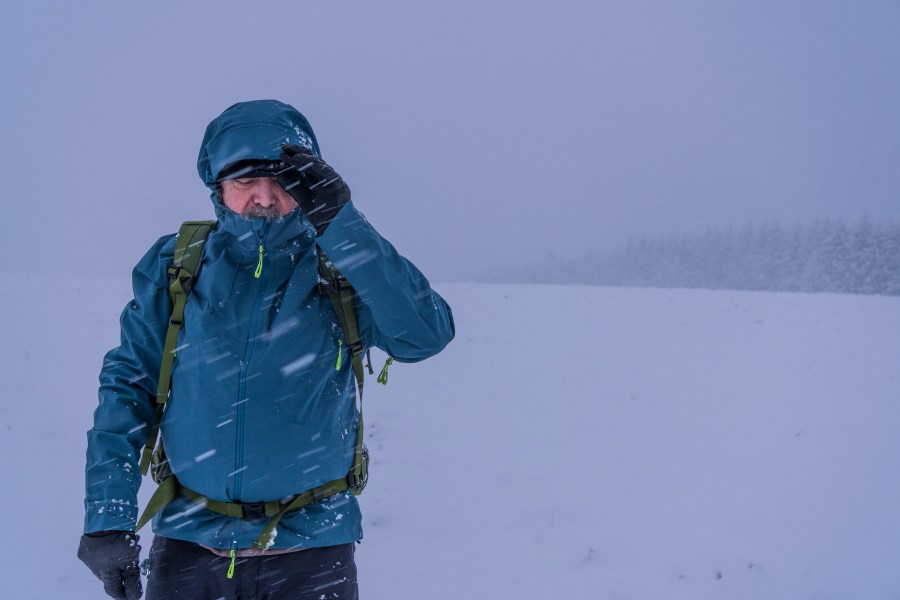
Waterproof jackets are often one of the pricier things we buy, so making sure it has everything we want as well as may want if we take up new activities is a big ask! Given how life saving they can be though, it’s not usually a place to scrimp, as you’ll find yourself replacing cheap jackets again and again while one with a higher price tag will last. Winter jackets are often pricier, so if you know you’re not out in full on winter conditions, it may be possible to opt for a lighter, less expensive option.
The best waterproof jackets of 2025
This guide contains of the best hardshell jackets for 2025 according to our expert reviewers, Kirsty Pallas and Chris Townsend. Most of these are three-season hardshells but there are also options that will suit tough winter trips in snow too. The jackets have been chosen on the basis of their protection, breathability and durability, with weight, packability, features, fit sustainability and value influencing our decisions too.
| Quick List |
|---|
| Best in Test for women: Alpkit Sigma – buy now from Alpkit |
| Best in Test for men: Montane Cetus Lite – buy now from Montane |
| Greener Choices: Tierra Vastra / Alpkit Sigma / Montane Cetus Lite |
| Best Value for women: Harrier Exmoor – buy now from Harrier |
| Best Value for men: Highlander Munro V2 – buy now from Highlander |
| Lightest for women: Patagonia M10 Storm – buy now from Cotswold Outdoor |
| Lightest for men: Montane Cetus Lite – buy now from Montane |
Alpkit Sigma
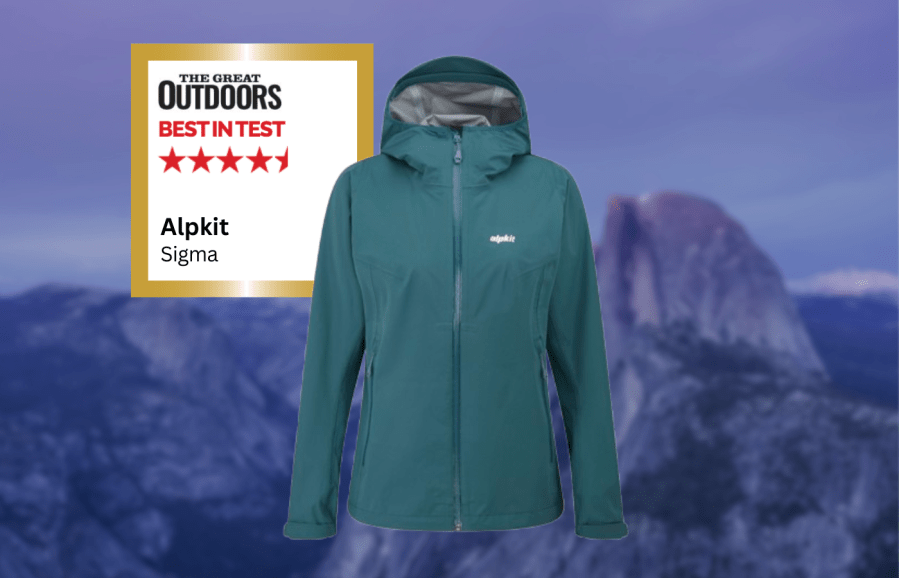
Kirsty Pallas’ Best in Test & Greener Choice
The Sigma should work for many people and activities due to its light weight and its price. The eco credentials are an added bonus.- low profile fit
- neat cuffs and hood
- Pockets sit under rucksack or harness waist strap
| Quick specs |
|---|
| Price: $220 / £169.99 |
| Weight: 340g (size 10) |
| Materials: 100% recycled polyester with PFC free DWR coating |
| Hood: Wired peak, volume adjuster, elasticated sides |
| Front Closure: YKK Aquaguard zip with inner storm flap |
| Underarm/Side Zips: No |
| Pockets: 2 large hand pockets |
| Hem: Drawcord adjustment |
| Cuffs: Elasticated with velcro |
| Sizes: 6 – 20 |
| Men’s version: Yes |
| alpkit.com |
The Sigma is a nice three season jacket from Alpkit, and highlights their commitment to sustainability by not only using 100% recycled materials, but making sure they can all be recycled again at the end of the jacket’s life. I really like the fit and feel of the jacket. It’s neat without being overly tight, and it has a flexible feel, in part due to not using a Gore-Tex membrane. It dealt with all rain I experienced without issue and, as with most modern fabrics, keeping it clean will help it to continue to do so.
The price point and lighter weight mean it should work for a wide range of people and for a range of activities. I plan to use it climbing, walking, mountaineering and biking, all of which it will manage with ease.
Read more: Kirsty’s full Alpkit Sigma review
Montane Cetus Lite
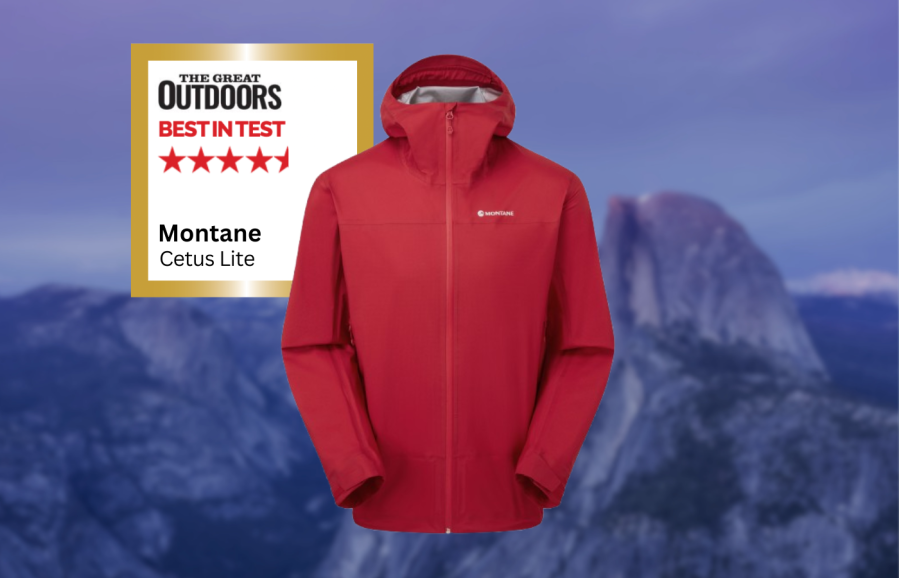
Chris Townsend’s Best in Test & Greener Choice
I think this is a superb three-season hillwalking and backpacking jacket. It’s also my Greener Choice.- breathability
- lightweight
- soft fabric
- recycled fabric
- front drawcords inside jacket
- no chest pocket
| Quick specs |
|---|
| Price: $349 / £270 |
| Weight: 335g (XL) |
| Materials: PFC – free recycled nylon, hydrophilic polyurethane membrane |
| Hood: front and rear adjustment, wired stiffened peak |
| Front Closure: YKK AquaGuard Zip, inner flap |
| Underarm/Side Zips: No |
| Pockets: 2 hand pockets |
| Hem: Drawcord adjustment |
| Cuffs: Velcro |
| Sizes: S – XXL |
| Women’s version: Yes |
| montane.com |
The Montane Cetus Lite is made from the brand’s new Petrichor Technology, which has a hydrophilic membrane that not only claims to be ‘extremely breathable’ but also to breathe better the harder you work. Big Claims! How do they stack up? Pretty well, in fact.
I’ve worn the jacket in many hours of heavy rain in a wide range of temperatures and wind speeds and have stayed fairly dry inside. Not totally – there has been some condensation at times – but certainly drier than in many other waterproofs. In tests, Petrichor Technology has a Ret value of <5, which puts it in the ‘very good or extremely breathable’ category. I’d agree with ‘very good’. I don’t think any waterproof fabric suitable for the hills is ‘ extremely’ breathable.
Read more: Chris’ full Montane Cetus Lite review
Patagonia M10 Storm
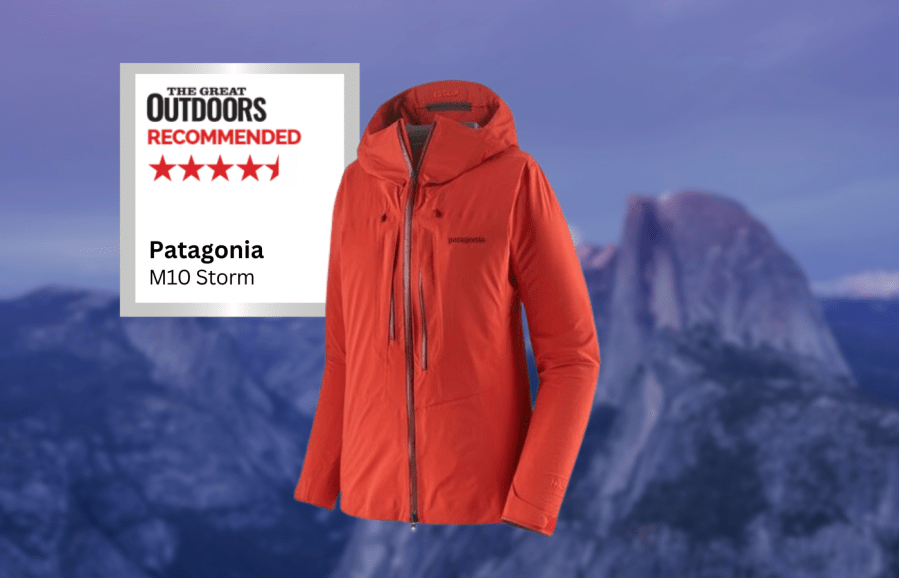
Kirsty Pallas recommends
The barely there feel, with a bit of stretch, makes this a great option for mountaineering as the jacket moves with you.- weight
- neat fit
- price
- durability
| Quick specs |
|---|
| Price: $465 / £360 |
| Weight: 279g (size small) |
| Materials: 100% recycled nylon H2No shell with DWR finish made without added PFAS |
| Hood: Stiffened peak with Recco strip, volume adjusters at back and sides |
| Front Closure: 2 way waterproof zip with internal storm flap |
| Underarm/Side Zips: No |
| Pockets: 2 napoleon pockets of different sizes |
| Hem: Drawcord adjustment |
| Cuffs: Velcro |
| Sizes: XS – XL |
| Men’s version: Yes |
| eu.patagonia.com |
Patagonia’s new M10 range really is incredibly light – I didn’t believe there was anything in the box when the Patagonia M10 Storm jacket arrived! The range has been designed for use in Alpine climates, and you can feel that in the jacket as soon as you put it on. It has a barely there feel, with a bit of stretch in the fabric, making it a great option for climbing and mountaineering as it just moves with you. The waterproof membrane is Patagonia’s own H2NO and the jacket is a three-layer design.
My main concern with this jacket is the durability in the waterproofing in UK winter conditions, as generally a lighter weight garment will let water through quicker than a thicker one. Given that on around half my winter days out my jacket will wet out, I’ll be reaching for this one when there’s more Alpine like conditions with drier weather or lower freezing levels.
Read more: Kirsty’s full Patagonia M10 Storm review
Harrier Exmoor
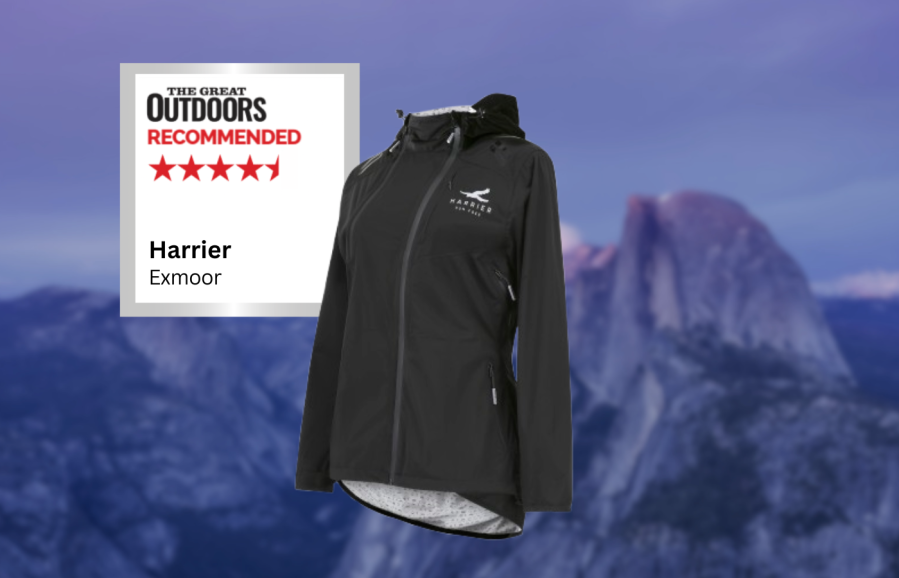
Kirsty Pallas’ Best Value
I’ve enjoyed wearing the Exmoor as it doesn’t feel like a waterproof at all. It’s soft, flexible and quiet.- soft feel
- ventilation options
- waterproofed rated to moderate rain
| Quick specs |
|---|
| Price: $122 / £94.99 |
| Weight: 309g (size XS) |
| Materials: 100% polyester |
| Hood: Stiffened peak with volume adjusters at back and sides |
| Front Closure: Offset front zip with internal storm flap and studs |
| Underarm/Side Zips: Yes, small pit zips |
| Pockets: 2 hand pockets, 1 back pocket, 1 chest pocket |
| Hem: Drawcord adjustment with an inner elasticated skirt |
| Cuffs: Elasticated with thumb loops |
| Sizes: XS – XL |
| Men’s version: Yes |
| harrierrunfree.co.uk |
The Harrier Exmoor is a trail running jacket and I’m about as far from a trail runner as it gets, so bear with me! I wasn’t sure whether this would work for me, but the Exmoor almost got the Best in Test. I’ve really enjoyed wearing it as it doesn’t feel like a waterproof at all. It’s soft, flexible and quiet. It’s a good fit, and I can still just about get a duvet jacket on underneath.
The only slight drawback is the waterproof rating. I understand that it’s a compromise for a running jacket, so for me this is a jacket for lighter summer rain and drizzle. There are a couple of other nifty features like being able to pack it away into its own back pocket, and it can also be used as a bumbag in itself.
Read more: Kirsty’s full Harrier Exmoor review
Tierra Vastra
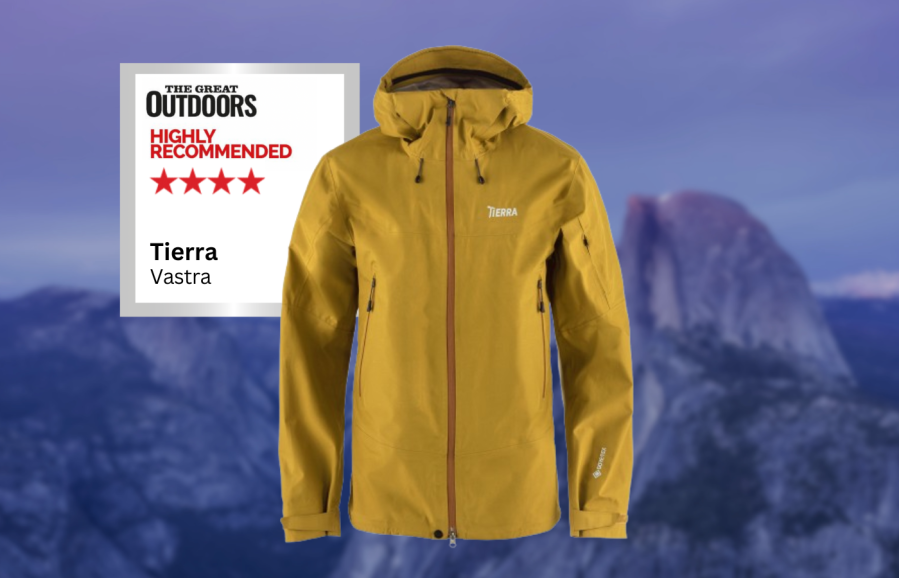
Chris Townsend highly recommends
It is an excellent jacket and suitable for year-round use, though perhaps a little heavy for summer. It’s also my Greener Choice.- ePe Gore-Tex
- hood
- pockets
- side zips
- not that light
- cost
| Quick specs |
|---|
| Price: $465 / £360 |
| Weight: 530g (L) |
| Materials: PFC – free 3 – layer ePE Gore – Tex polyester/polyethylene |
| Hood: front and rear adjustment, wired stiffened peak |
| Front Closure: YKK front zip, inner flap |
| Underarm/Side Zips: side |
| Pockets: 2 mid, 1 sleeve, 2 stretch inner |
| Hem: Drawcord adjustment |
| Cuffs: Velcro |
| Sizes: S – XXL |
| Women’s version: yes |
| tierra.com or trekitt.co.uk |
The Tierra Vastra is made from the new ePe (expanded polyethylene) membrane from Gore-Tex which is fluorocarbon free – unlike the classic Gore-Tex membrane. This is a welcome development. It’s just as waterproof with a hydrostatic head of 28,000 and adequately breathable with a RET of <13. I find it just about impossible to distinguish between the two different Gore-Tex fabrics in use.
The Vastra does rustle a little but has a fairly soft feel. It is comfortable to wear. It is an excellent jacket and suitable for year-round use, though perhaps a little heavy for summer. The cost is quite high but it does have that Gore-Tex name.
Read more: Chris’ full Tierra Vastra review
Outdoor Research Foray
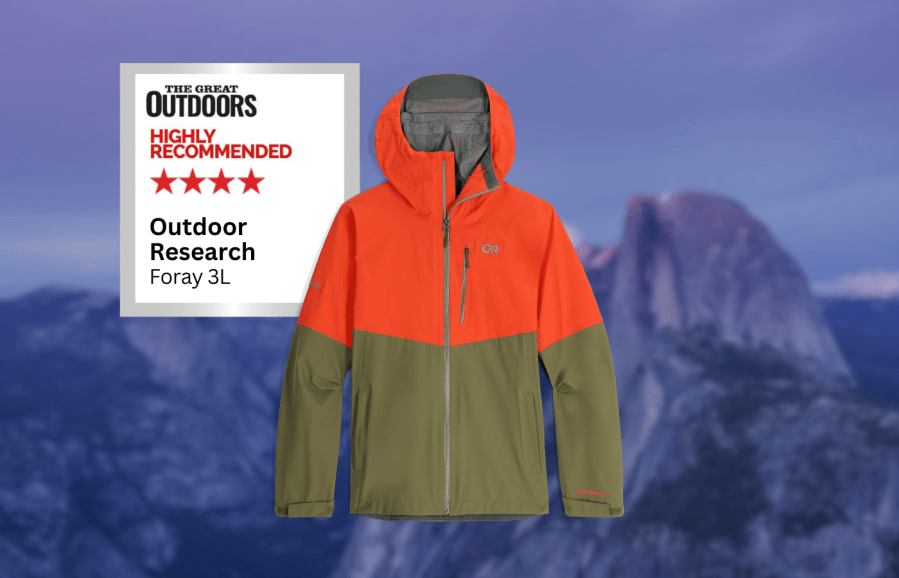
Chris Townsend Highly Recommends
The Foray 3L is comfortable to wear and excellent for three-season use. It’s good in winter weather too, if lacking a stiffer hood.- side vents
- breathability
- soft fabric
- recycled fabric
- front hood drawcords inside jacket
- hood peak could be stiffer
| Quick specs |
|---|
| Price: $336 / £260 |
| Weight: 475g (L) |
| Materials: bluesign® Approved PFAS-free AscentShell Dry 3L 100% Recycled Nylon 40D with Nikwax DWR |
| Hood: front and rear adjustment, stiffened peak |
| Front Closure: YKK AquaGuard Zip, inner flap |
| Underarm/Side Zips: full-length two-way side |
| Pockets: 2 hand pockets, 1 chest |
| Hem: Drawcord adjustment |
| Cuffs: Velcro |
| Sizes: XS – XXXL |
| Women’s version: Yes, the Aspire 3L Jacket |
| outdoorresearch.com |
The latest version of the Foray jacket, new last year, is made from AscentShell Dry, which is exclusive to Outdoor Research and made by a complex electrospinning process. The fabric is soft, quiet, slightly stretchy and made from 100% recycled nylon with a Nikwax Direct.Dry DWR that’s also exclusive to Outdoor Research. Outdoor Research says it offers ‘superior breathability’. I’ve certainly found the breathability as good as most. The Foray 3L has an excellent feature that really enhances the comfort – zipped vents that stretch from the biceps to the hem. This allows far more ventilation than standard under arm zips and for dumping excess heat and moist air, venting always beats fabric breathability, so this makes a big difference to comfort. You can even open both sides and wear the jacket as a poncho.
The Foray 3L is comfortable to wear and excellent for three-season use. It’s good in winter weather too, although I’d prefer a stiffer hood peak then.
Read more: Chris’ full Outdoor Research Foray 3L review
Sprayway Corbitt
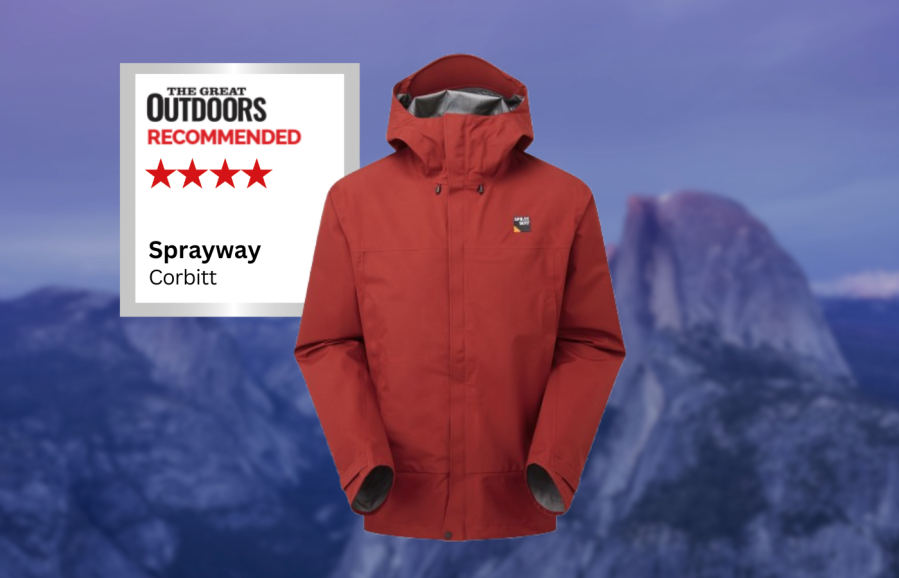
Kirsty Pallas recommends
The simple design hits the key points to make this jacket a good all-rounder for typically British weather.- hood
- cuffs
- non waterproof zip
- inside pocket placement
| Quick specs |
|---|
| Price: $426 / £330 |
| Weight: 450g (size 10) |
| Materials: 100% polyester recycled with Goretex 75D |
| Hood: Wired peak with volume adjusters at back and sides |
| Front Closure: 2 way zip with internal and external storm flap and stud |
| Underarm/Side Zips: No |
| Pockets: 2 large hand pockets, and 1 internal |
| Hem: Drawcord adjustment |
| Cuffs: Velcro |
| Sizes: 8 – 18 |
| Men’s version: Yes |
| sprayway.com |
Sprayway are back to designing great hill gear, and this Corbitt jacket is an example of that. It’s a sleek and simple design, but hits the key points to make it a good all-rounder for typically British weather. The Gore-Tex membrane feels tough but combined with a well cut fit, it doesn’t feel too crinkly or stiff. I really like the hood and cuffs on this jacket, they’re well designed for use and ease of use too.
I’m impressed with the Corbitt and it really does feel like Sprayway have stepped up their gear to properly deal with all mountain weather. It’s a jacket I will use through winter, especially on those particularly manky days when it feels like you’re not sure why you’re even going out!
Read more: Kirsty’s full Spraway Corbitt review
Salewa Ortles 3L GTX
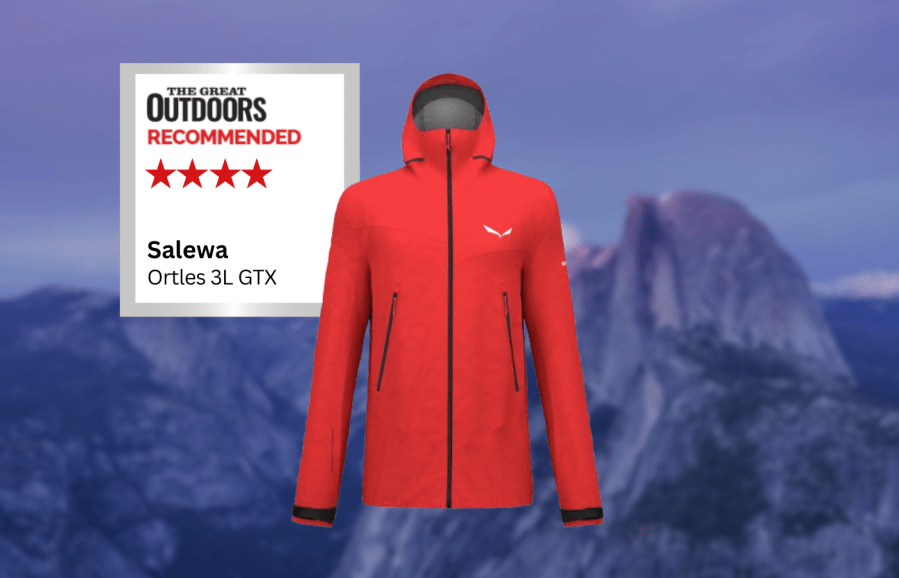
Chris Townsend recommends
The Ortles is the most expensive jacket tested. It is middling in weight and suitable for year-round use.- breathability
- pockets
- hood gusset
- cost
| Quick specs |
|---|
| Price: $470 / £365 |
| Weight: 500g (L) |
| Materials: Gore-Tex 2L Paclite Plus/ recycled polyester, Gore-Tex 3L recycled polyester |
| Hood: rear adjustment, zipped gusset for helmet compatibility, stiffened peak |
| Front Closure: YKK waterproof zip, inner flap |
| Underarm/Side Zips: zipped with flap on the back of the upper arms |
| Pockets: 2 mid hand, 2 stretch inner |
| Hem: Drawcord adjustment |
| Cuffs: Velcro |
| Sizes: XS – XXL |
| Women’s version: yes |
| salewa.com |
Unusually, the Ortles jacket is made from two different Gore-Tex fabrics, a durable 3-layer one on the front and upper arms and Paclite on the back, hood, and lower arms for reduced weight and increased packability. The fabrics are quite noisy and a little stiffer than on the other jackets reviewed in this test.
The jacket has a hydrostatic head of 28,000mm and a RET of <9. The last means breathability should be good and it is. I have to work quite hard to produce much condensation inside. When overheating does occur, there are zipped vents on the back of the upper arms. These aren’t as effective as underarm zips but are easier to use as they don’t run under pack shoulder straps.
The Ortles is the most expensive jacket tested. It’s mid-range in weight and suitable for year-round use.
Read more: Chris’ full Salewa Ortles 3L GTX review
Highlander Munro V2
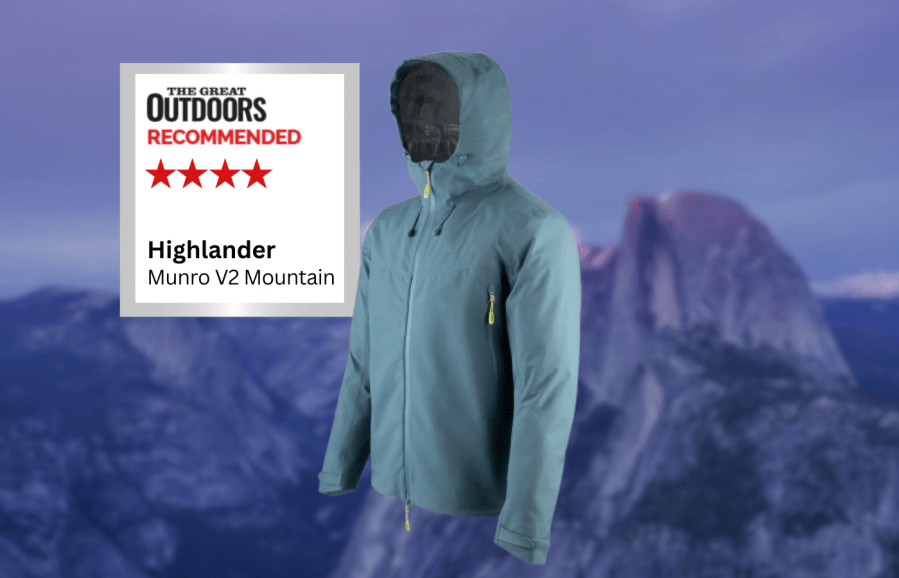
Chris Townsend’s Best Value
The Munro Jacket is comfortable and I’ve been happy wearing it in storms. It may be inexpensive but it doesn’t feel like a budget garment.- hood
- cost
- quite heavy
- no women’s version
| Quick specs |
|---|
| Price: $232 / £180 |
| Weight: 580g (L) |
| Materials: 3 – layer PROT3X PFC Free polyester |
| Hood: front and rear adjustment, wired stiffened peak |
| Front Closure: YKK waterproof zip, inner flap |
| Underarm/Side Zips: two-way YKK zips |
| Pockets: two harness/hipbelt compatible, 1 inner |
| Hem: Drawcord adjustment |
| Cuffs: cuffs |
| Sizes: S – 2XL |
| Women’s version: no |
| highlander-outdoor.com |
The Highlander Munro V2 Mountain Jacket is a fully specified jacket suitable for year-round use at a low cost, making it superb value for money. The hydrostatic head rating of 20,000mm (the height of a column of water that can stand on the fabric before it leaks) compares well with that of many far more expensive jackets. In heavy rain it has proved fully waterproof. Breathability however is on the low side at 15,000 MVTR (Moisture Vapour Transmission Rate). Top end jackets are usually at least 20,000. In practice I have found condensation appearing inside a bit sooner than with the other jackets tested but it’s not been a problem. A main reason for this is that the Munro has long underarm zips so damp air can be easily expelled. This is an excellent feature, especially given the price.
The Munro Jacket is comfortable and I’ve been happy wearing it in storms. It may be inexpensive but it doesn’t feel like a budget garment. It is quite heavy, the heaviest jacket tested, and maybe overkill for summer backpacking, but at the same time it’s adequate for winter mountain use.
Read more: Chris’ full Highlander Munro V2 review
Berghaus Ridge Seeker
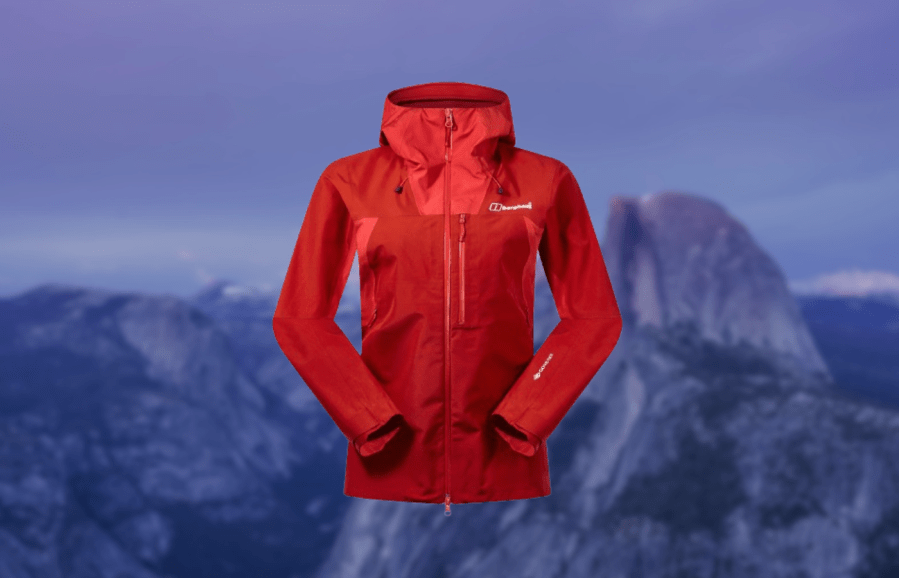
Kirsty Pallas’ verdict
Overall, it’s a solid jacket with good features that are almost ideal but just need a little tweak to make it a great jacket.- durability
- roomy fit
- pocket placement
| Quick specs |
|---|
| Price: $452 / £350 |
| Weight: 440g (size 10) |
| Materials: Goretex 3L 100% polyester with ePE membrane |
| Hood: Wired peak with volume adjusters at back and sides |
| Front Closure: 2 way waterproof zip with internal storm flap |
| Underarm/Side Zips: 2 way pit zips |
| Pockets: 2 hand pockets, 1 external chest and 1 internal chest |
| Hem: Drawcord adjustment |
| Cuffs: Velcro |
| Sizes: 8 – 20 |
| Men’s version: Yes |
| berghaus.com |
This jacket from Berghaus is about as classic a jacket you can get. The Gore-Tex 3L fabric feels tough and durable, meaning the Berghaus Ridge Seeker feels ready to take a bit of a battering in winter. There’s a good selection of pockets with the hand pockets just big enough to fit a map, and both the internal and external chest pockets a good option for a phone. The hand pockets do sit lower than I’d like, and so get in the way of a rucksack or harness waist belt, which limits what I put in them.
Overall, it’s a solid jacket, with good features that are almost ideal but just need a little tweak to make it a great jacket.
Read more: Kirsty’s full Berghaus Ridge Seeker review
How we tested
Chris tested his jackets on day walks and multi day trips in the Scottish Highlands from spring 2024 through to early 2025. He is short and mostly wears a size large. Conditions included heavy rain, soaking drizzle, blizzards, and ferocious winds.
Kirsty tested these jackets through Autumn and early winter in Scotland while hillwalking, biking and mountaineering in a mix of rain, snow and even some sunshine. Kirsty is a short size 8-10 and was aiming to get several layers under each jacket.
All weights are taken from the reviewer’s own scales. Most of the jackets tested are three-season hardshells but there are also options that will suit tough winter trips in snow too. The jackets have been chosen on the basis of their protection, breathability and durability, with weight, packability, features, fit sustainability and value influencing our decisions too. These reviews were first published in the April 2025 issue of The Great Outdoors.
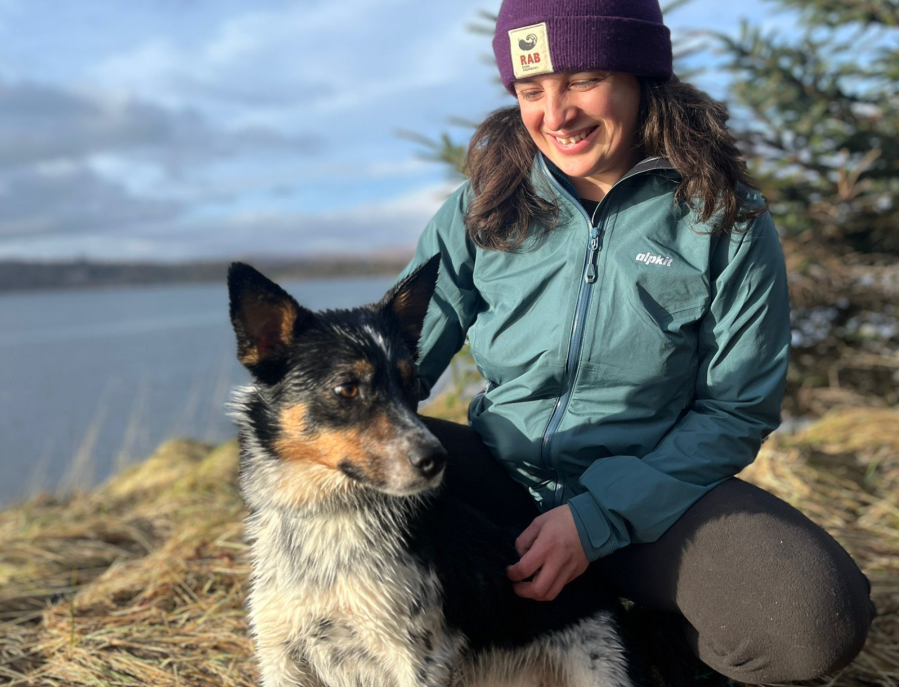
How to choose the best waterproof jacket for you
Finding the right waterproof jacket can greatly enhance your comfort and performance in adverse weather conditions. It’s also absolutely crucial from a safety perspective. First and foremost, the main things to assess when choosing a rain jacket are the levels of waterproofness and breathability as these determine its ability to keep you dry while allowing moisture to escape. Additionally, consider the hardshell jacket’s durability, weight, and packability to match your intended activities and environment. If you like to move fast and light, for instance, then a lightweight 2.5-layer shell that’s light on features will be best for you. Conversely, if you’re into your winter mountaineering then you’ll want a more durable shell – 3-layer perhaps – with pockets and lots of adjustment.
Pay attention to features like hood design: is there adjustment so that it will hold in high winds? And pocket placement: will they be accessible when you’re wearing a baclpack with a hipbelt? You’ll also want to take into account the jacket’s fit and sizing to ensure optimal comfort and freedom of movement – many of our full individual jacket reviews will specify whether a jacket is true to size or not. If we don’t specify in the review, please feel free to get in touch with us directly to ask.
Finally there’s the sustainability side of things. If you’re conscious of the environmental impact of products, check whether any recycled materials are present and also whether the materials can go on to be recycled when the jacket comes to the end of its life. Some jackets these days still come with PFCs. These are water resistant chemicals that often escape through our washing machines and into the world’s water supplies where they stay for a very long time. Studies have found these in the world’s deepest oceans and even on the summit of Everest!
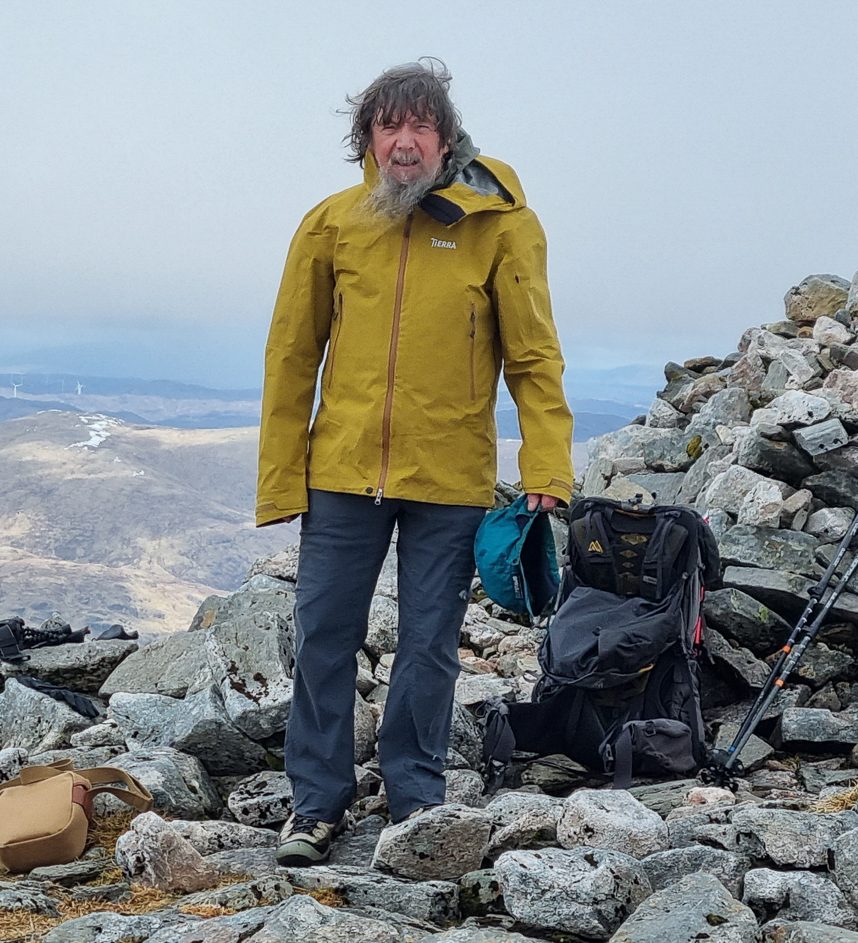
Fabric
The fabric determines how ‘breathable’ a garment will be. All waterproof fabrics are fully waterproof regardless of cost. Thicker fabrics give better protection in winter weather.
Construction
Waterproof fabrics are made up of layers of material. The most durable construction is three-layer in which the waterproof layer is sandwiched between the face fabric and an inner layer.
Hood
Hoods should be easily adjusted and move with your head. A wired or stiffened peak is useful in wind driven rain and snow. Helmet-compatible hoods should have volume adjusters so they can be reduced in size without affecting your vision for non-helmet wear.
Front Closure
Water-resistant zips are now standard. These are not fully waterproof in driving rain and should have an inner flap to repel any rain that gets through.
Ventilation
Underarm/side zips can be awkward to use but do allow good ventilation. They can often be used when the front zip has to be closed due to rain or snow. Zips that curve under the armpits are effective but the most difficult to adjust. Side zips that run from the armpit down the jacket are much easier to use.
Cuffs
Cuffs that can be opened wide are good for ventilation in the arms. Elasticised and narrow cuffs can lead to sweaty wrists.
Pockets
Whilst not essential pockets that are accessible when wearing a rucksack hipbelt are useful for items like compass, phone, snacks, map, hat and gloves.
DWR
The durable water repellency treatment (DWR) makes water bead and run off fabrics. In time this degrades and needs to be restored with a wash-in or spray-on product. The DWR does not affect the waterproofness of a garment but does reduce the breathability when it wears off gets dirty so you get more condensation inside. The DWR treatment used for many decades is being phased out as it contains environmentally damaging PFCs. Unfortunately, PFC-free DWRs do not last as long so garments need washing and reproofing more often.
Fit
For the most efficient breathability, the best waterproof jackets should fit fairly closely. At the same time, they shouldn’t be so tight that they restrict movement. And a rain jacket should fit comfortably over all the layers you might need to wear underneath it. Size labels should be taken as a guide only – they’re not consistent between makes.
Waterpoofing, breathability, adjustment, fit, features, sustainability and of course price. There’s a lot to consider, but by carefully weighing these up you can make a well-informed choice and invest in a waterproof shell that could serve you well and for a long, long time.
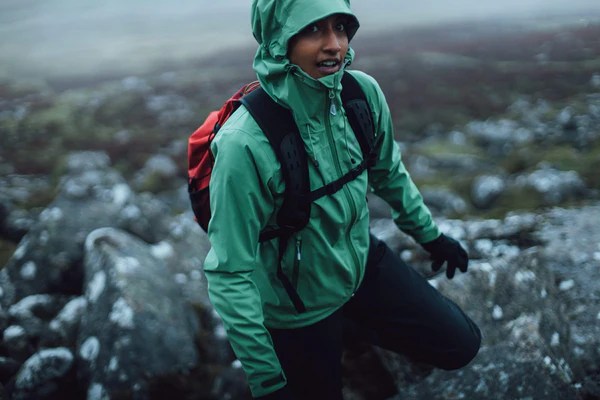
Measuring waterproofness and breathability
If you want to know how to stay dry when hiking in the rain, it’s important to consider a rain jacket’s waterproofness and breathability. If the weather is wet and warm, the fabric needs to have the capacity to let the moisture created by sweat to escape, otherwise you will end up damp inside the rain jacket. These days there are excellent waterproof and breathable membranes (which are also windproof). Most jackets also have a durable waterproof repellency (DWR) treatment added to the outer layer of fabric.
The waterproofness of a rain jacket is measured by determining the height of a column of water that the fabric can withstand before it starts to leak through. The resulting figure is known as the hydrostatic head (HH) and this is expressed in millimetres – the higher the number, the more waterproof the jacket is considered to be.
The breathability of waterproof garments is determined by the “Moisture Vapor Transmission Rate” (MVTR). This test measures the amount of water vapor that can pass through the jacket’s fabric over a given period of time. The unit of measurement used is typically grams per square meter per 24 hours (g/m²/24h). The higher the MVTR rating, the more breathable the jacket is considered to be.
Finally, colour choice may seem less important but a brighter shade will allow you to be more easily seen should you get into difficulty. Black, dark blues and greens blend in rather than stand out. Also, very light shades will show the dirt quickly.
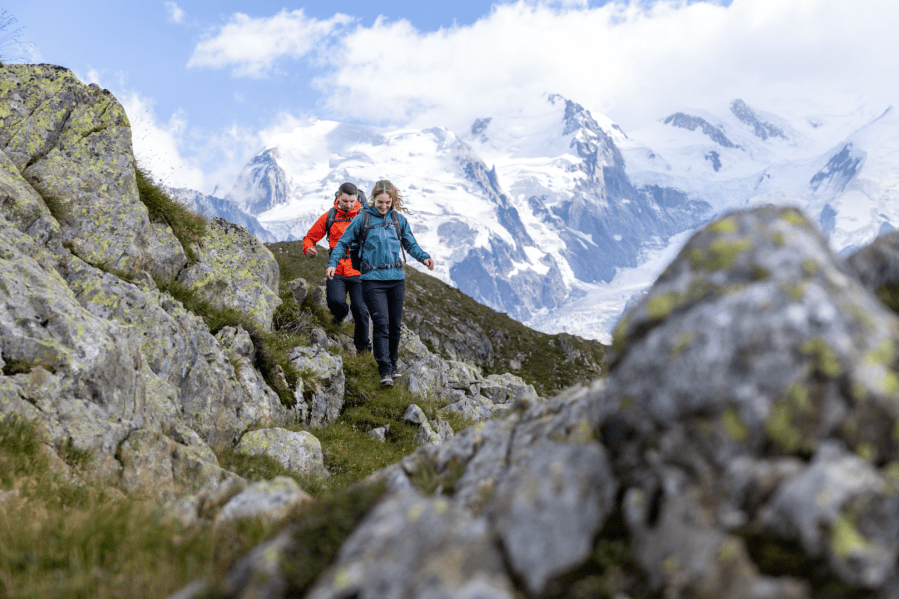
Waterproof fabrics and their ratings
- Hydroshell (Berghaus) – HH: 15,000 mm | MVTR: 20,000 g/m²/24h (official)
- Dermizax EV – HH: 25,000 mm | MVTR: 20,000 g/m²/24h (official)
- Unbranded (Alpkit Balance) – HH: 20,000 mm | MVTR: 20,000 g/m²/24h (official)
- Polartec Power Shield – HH: 20,000 mm | MVTR: 20,000 g/m²/24h (official)
- Futurelight (The North Face) – HH: Unknown | MVTR: 75,000 g/m²/24h (official)
- Pertex Shield – HH: 20,000 mm | MVTR: 20,000 g/m²/24h (estimated)
- H2No (Patagonia) – HH: 10,000mm to 20,000 mm | MVTR: 12,000 – 15,000 g/m²/24h (estimated)
- Omni-Tech (Columbia) – HH: 10,000 mm | MVTR: 10,000 g/m²/24h (estimated)
- eVent – HH: 30,000 | MVTR: 15,000 to 25,000 g/m²/24h (estimated)
- Gore-tex – HH: 28,000 mm | MVTR: 17,000 g/m²/24h (estimated)
- Gore-tec Paclite – HH: 28,000 mm | MVTR:15,000 g/m²/24h (estimated)
- Gore-tex Pro – HH 28,000 mm | MVTR: 25,000 g/m²/24h (estimated)
How to look after your waterproof jacket
Looking after waterproof jackets can be trickier than a normal piece of clothing; they require a certain amount of upkeep if they are to continue to keep you dry and perform well for a long time. Dirty rain jackets don’t let body moisture through very well, so you get damp from condensation building up inside the rain jacket as you sweat quicker. The Durable Water Repellency (DWR) treatment on the outside of hardshell jackets that causes rain to bead and run off rather than soak in can also wear off and need replacing over time. This also leads to condensation as the garment is then less breathable.
There are two main elements to waterproof jacket care: washing, and restoring the jacket’s DWR treatment. Our guide on how to look after your waterproof jacket will further help you to understand common problems with hardshells, rain jackets and how to manage them.

